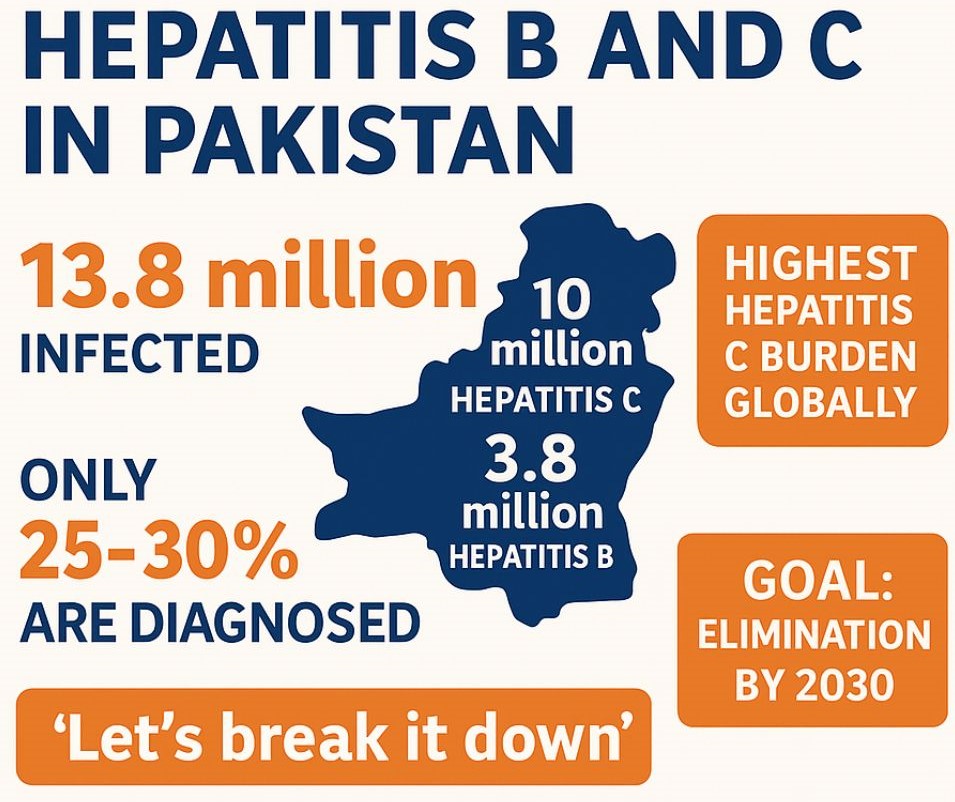WHO Warns of ‘Silent Crisis’ as Over 13.8 Million Pakistanis Infected with Hepatitis B and C
The World Health Organization (WHO) has sounded the alarm on the critical hepatitis crisis in Pakistan, urging the government and health authorities to intensify efforts to detect and treat more than 13.8 million people infected with hepatitis B and C. Amidst ongoing concerns, Pakistan is identified as bearing the world’s highest burden of hepatitis C, accounting for 10 million of the estimated 60 million global cases, in addition to 3.8 million hepatitis B infections.
On the occasion of World Hepatitis Day, WHO reiterated its dedication to supporting Pakistan’s fight against hepatitis, a disease that continues to cause widespread liver damage and cancer across the country. The majority of people living with hepatitis are unaware of their infection—only 25–30% know their status—hindering timely and potentially life-saving treatment.
Under this year’s international theme, “Let’s break it down,” WHO has called on policymakers and health authorities to simplify, expand, and integrate hepatitis prevention and treatment services into broader national health systems. This approach encompasses strengthening vaccination coverage, promoting safe injection and blood transfusion practices, expanding access to harm reduction measures, and most crucially, scaling up testing and treatment initiatives. The overarching objective is to eliminate hepatitis as a public health threat by 2030.
WHO has reiterated its full backing of Pakistan’s Prime Minister’s National Programme for the Elimination of Hepatitis C Infection, a major public health initiative aiming to screen half of Pakistan’s eligible population—approximately 82.5 million individuals aged 12 years and above—and provide treatment to five million patients by 2027. Dr. Dapeng Luo, WHO Representative in Pakistan, affirmed the organization’s commitment to supporting Pakistan in strengthening prevention, detection, and treatment services to ensure that vulnerable populations are not left behind.
While both hepatitis B and C are preventable and treatable, the risk of severe medical complications—including cirrhosis and liver cancer—remains high if left unaddressed. In Pakistan, the viruses are commonly transmitted through unsafe blood transfusion practices, often linked to unregulated private blood banks and insufficient screening. Additional risk factors include the reuse of non-sterile syringes and needles, unsafe surgical and dental procedures, body piercings, tattoos, and even shaving at barber shops.
Globally, chronic viral hepatitis is responsible for approximately 1.3 million deaths annually, or about 3,500 lives lost each day, predominantly due to liver cancer and cirrhosis.
WHO pledged to continue its partnership with Pakistan, pledging science-based guidance and support to bolster prevention efforts, such as ensuring newborns receive hepatitis B vaccinations within 24 hours of birth. The agency emphasized the importance of ensuring equitable access to diagnosis and treatment services, regardless of location or socioeconomic status, in pursuit of ending hepatitis as a public health menace.


